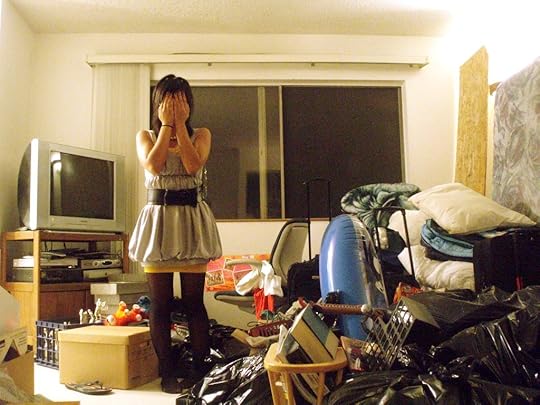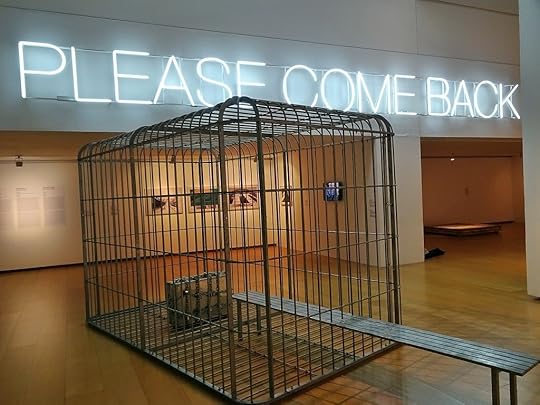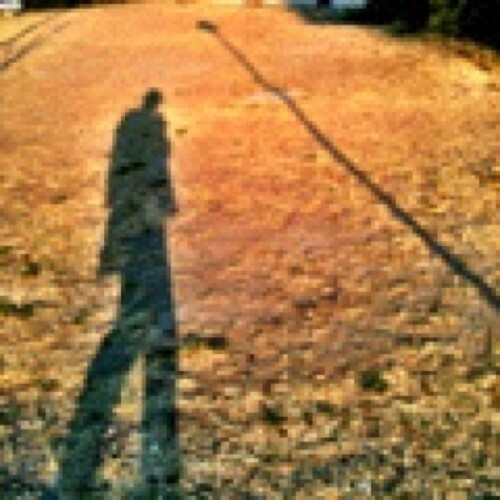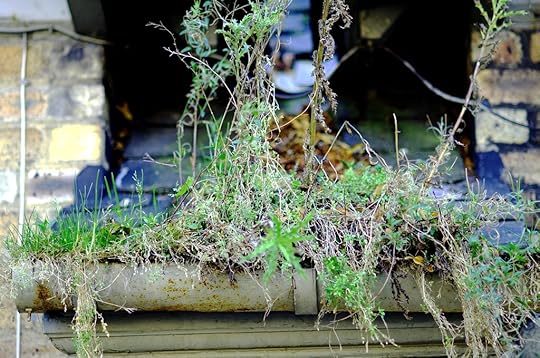Robin Helweg-Larsen's Blog, page 7
July 5, 2025
Sonnet: Gail White, ‘Moving’

How difficult it is to move,
Even from simple place to place.
How hard to pack the books, to shove
The cat into its carrying case.
How hard to sit in Airportland
Through one more endless flight delay
While Trebizond or Samarkand
Wait half a universe away.
How hard to get the papers filed
That separate you from your past,
Newly and legally enisled.
And yet, and yet my father’s last
Great journey out of self to shade –
How easily and quickly made.
*****
Gail White writes: “I admit I love this one. I’ve experienced all of it except the change of citizenship – the trials of moving house, the frustrations of airline travel – and my father’s easy transition, just lying down and quietly going on his way. It turned into a sonnet before I even thought about it.”
First published in The Formalist.
Gail White lives in the Louisiana bayou country with her husband and cats. Her latest chapbook, Paper Cuts, is available on Amazon, along with her books Asperity Street and Catechism. She appears in a number of anthologies, including two Pocket Poetry chapbooks and Nasty Women Poets. She enjoys being a contributing editor to Light Poetry Magazine. Her dream is to live in Oxfordshire, but failing that, almost any place in Western Europe would do.
“EEEEEK! CHAOS.” by confidence, comely. is licensed under CC BY-NC 2.0.
July 4, 2025
Nonce form: Stephen Edgar, ‘In Search of Time to Come’

There’s not much noise above the sputtering fire.
They don’t speak much.
The children are settling to a private croon,
Though the baby whimpers, palping blindly to clutch
At a breast. Farther back, picked out by a
Final index finger of the sun, someone squats.
They’ll be changing their abode quite soon,
No doubt.
The time requires a tacit finishing touch,
From women working at rough pots
And men scraping a hide to peg it out.
This mood, this life, is like a circle, turning
Always back
On itself: expectation interlocking
Ritual; impulse to novelty, for lack
Of its not yet invented learning,
Subsiding again to things that they take pleasure from.
A hum. A mother’s body rocking,
They are, you would say, at home.
Only the cave mouth, that changeable screen,
Opens a gap
In the circumference; and when the light
Is gone, they have no words by which to trap,
Or the notions by which words could mean,
What that black window’s showing for them to detect,
As they look, perplexed, into the night
And stare,
Then turn towards each other’s bodies to tap
Their comfort. Someone, they suspect,
Is out there; and they’re right. We are out there.
*****
Stephen Edgar writes: “I can no longer remember the specific circumstances which gave rise to this poem, but it was possibly some television documentary about ancient hominins. As Philip Larkin said in a rather different context, “Truly, though our element is time,/ We are not suited to the long perspectives/ Open at each instant of our lives.” The vertiginous gulf of time between ourselves and our earliest ancestors is a subject that has always fascinated me, and I have written other poems dealing with it; indeed, my next book opens with a poem on a similar theme. The difference with In Search of Time to Come is the notion of these ancient humans attempting to peer forward into the deep future, rather than modern humans gazing back into the deep past.
“The poem is metrical with full rhyme. The stanza form, for stanzas one and three, is one of my own devising, with varying line lengths and complex rhyme scheme. Stanza two varies the pattern, breaking off after eight lines, with a slight adjustment to the rhyme scheme. Why? I can’t remember; it was a spontaneous idea that occurred to me in the writing.
As far as I can remember, this poem had no magazine publication and first appeared in my second book Ancient Music (Sydney, Angus & Robertson, 1988), which is out of print. It has been republished in The Strangest Place: New and Selected Poems (Melbourne, Black Pepper, 2020), which is available on the Black Pepper website.”
Stephen Edgar was born in 1951 in Sydney, where he grew up. From 1971 to 1974 he lived in London and travelled in Europe. On returning to Australia he moved with his then partner to Hobart, Tasmania, where he attended university, reading Classics, and later working in libraries. Although he had begun writing poetry while still at high school, it was in Hobart that he first began writing publishable poems and found his distinctive voice. He became poetry editor of Island Magazine from 1989 to 2004. He returned to Sydney in 2005. He is married to the poet Judith Beveridge.
He has published thirteen full collections: Queuing for the Mudd Club (1985), Ancient Music (1988), Corrupted Treasures (1995), Where the Trees Were (1999), Lost in the Foreground(2003), Other Summers (2006), History of the Day (2006), The Red Sea: New and Selected Poems (2012), Eldershaw (2013), Exhibits of the Sun (2014), Transparencies (2017), The Strangest Place: New and Selected Poems (2020) and Ghosts of Paradise (2023). A small chapbook, Midnight to Dawn, came out in 2025, and a new collection, Imaginary Archive,will be published in late 2025. His website is www.stephenedgar.com.au, on which publication details of his books, and where they can be purchased, are given.
He was awarded the Australian Prime Minister’s Award for Poetry in 2021 for The Strangest Place.
Photo: “Leave the door open!” by In Memoriam: VernsPics is licensed under CC BY-NC-ND 2.0.
July 2, 2025
Marcus Bales, ‘Rule Number One’

For Linda, who said it first
If you’re going to have a reading
then no matter where you are
for a minimum of breeding
you have got to have a bar.
You will fill up all the seating,
they will come from near and far,
if the best part of your greeting
is “Why, yes we have a bar!”
But the evening will be fleeting
even if you’ve booked a star
when it’s alcohol they’re needing
and you do not have a bar.
They will freeze in scanty heating
and they’ll swelter till they char
if you advertise by leading
with the fact you have a bar.
Though it’s raining or it’s sleeting
if you offer them a jar
they’ll be aleing, beering, meading,
and absinthing at the bar.
But when poetry starts bleeding
out of every scab and scar
all you’ll see is me retreating
if you haven’t got a bar.
*****
Marcus Bales writes: “For an interesting while I had an art gallery in a downtown mall in Cleveland. The mall rules said it had to be open on Saturdays — when there was no mall traffic and so no real reason to be open. So I held the Every Saturday at Noon in the Galleria Poetry Reading. Dramatically unsuccessful at first it eventually found its audience and we had a good time. But in talking about why, serving only coffee, Linda pointed out that if we could serve alcohol attendance would improve. Since it was an art gallery, and there is a tradition in art galleries of serving wine at openings, I changed the title to the Poetry Reading Art Opening and said wine and coffee would be available in limited quantities. That did the trick. It quickly became the best-attended poetry reading in the city, any day, any time. Then the authorities got wind of it and someone from the city visited and pointed out gently that while it was a tradition to serve wine at art openings in art galleries, it is technically illegal by state law, even if it is free, and they cited the appropriate code. In the end it didn’t matter much, since even the most successful poetry readings count their audiences in the low-to-mid-tens of people, and by then people had got in the habit of Saturday At Noon, and kept coming anyway even after we stopped serving wine. But the idea for the poem had formed.”
Not much is known about Marcus Bales except that he lives and works in Cleveland, Ohio, and that his work has not been published in Poetry or The New Yorker. However his ‘51 Poems‘ (which includes the above) is available from Amazon. He has been published in several of the Potcake Chapbooks – Form in Formless Times.
Photo: “Open Bar” by Trevor Benedict – MrEcho is licensed under CC BY-NC-ND 2.0.
June 30, 2025
Sonnet Crown: Amit Majmudar, ‘Recourse’

1.
Time, like love, is cyclic. Please come back
to me. I’ll stand here waiting, wanting while
the mare without her rider rounds the track.
I want to weave a crown for you, design
a daisy chain whose threaded stems become
a bracelet that handcuffs your wrist to mine.
My shadow’s gnomon tilts like a sun dial’s.
I know you’re somewhere close. I feel a thrum,
a thrill beneath the stillness of the earth,
the way a woman, days before the birth,
places her husband’s hand on the sea swell
that rises out of her and passes through her,
and, touching so much vastness, he can tell
for all their time as one, he never knew her.
2.
For all our time as one, I never knew you—
but doesn’t learning come from repetition?
I’ll do this better if I do it over.
I’ll know your every need by heart, pursue you
like truth. I’ll learn to be a truthful lover.
I’ll circle back to freshman year and woo you.
No song’s recorded in a single session.
No sinner’s shriven after one confession.
It’s time that grows the pearl. Nacre layers
the sand grain, like a secret in the mouth.
Repentance grows, too—grows by daily prayers
into a faith whose trigger seed was doubt.
I am a pearl diver in your depth.
I never left. I just came up for breath.
3.
I never left, I just came up for breath,
but now I am ready to follow you all the way down.
I’ve read we get euphoric as we drown.
Samsara swirls us under. When we break
the whitecaps for an instant, that is death.
Don’t make us wait to be reborn before
we love again. You know me—I’ll just make
the same mistakes. Or make things even worse.
So what if time’s a circle? Doesn’t mean
we have enough of it. The now we’re in
will never come again. So come again
into my life, and love me sight unseen.
We’re both at sea, and no good at dead reckoning.
A burning town’s the only lighthouse beckoning
4.
Our house of light is burning down. It beckons in
the gloaming. The road I’m roaming is a ring.
All time is circular. We’re only seconds in.
All reasoning is circular. I sing
the seasons all the way around the year.
There was a chemist once whose dream disclosed
benzene’s atomic structure. What appeared
before him was a serpent swallowing
its tail—aroma’s O, ouroboros.
I’m wise at last to what the image knows.
I see my answer now, my big mistake.
A ring! Why couldn’t it have been this clear
back then? I see it best when I’m awake.
I’ve circled back. But there is no one here.
5.
I’ve circled back, but there is no one where
the ring road ends. It ends in newfound ruins,
a shell-flecked nest, a rain-worn blade that bears
a message for us. Who can read the runes?
Nietzsche proclaimed the eternal return
and threw his arms around a bleeding horse
to feel the centuries reversing course.
His gooseflesh rose like spores that pock a fern.
Let vultures circle, only widdershins
above the ring road where I wait alone,
knifing in bark a promise of my own.
I know the ring road ends where it begins.
Time is a circle I can put to use:
a wheel to roll things back, a crown, a noose.
6.
A wheel to roll things back, a crown, a noose:
My own Venn diagram of rings to choose
from. Fill its center up with hourglass sand,
and that’s where Archimedes, kneeling, draws.
This is the Roman siege of Syracuse;
he’s hard at work on time, its shape and laws.
He looks up from a boot. A soldier stands
above him, dripping gladius in hand.
Do not disturb my circles, says the Greek.
The soldier studies them, then runs him through—
and so reveals what Archimedes seeks,
the circle, like a circuit, broken, weeks
and months and centuries and aeons spilling
in slow, concentric circles from the killing.
7.
In slow, concentric circles from the still-pink
narcotic kiss print of the cupping glass,
let your memories ripple outward, killing
the pain I’ve caused you. We are not our past,
though time is cyclic. Cycles can be broken,
souls reborn in this life, sleepers woken.
Not that I can sleep beneath this star.
Horizon, magic circle, boxing ring—
time is the space, the spell, the place we spar,
the dome in which your name is echoing.
It’s where I pray the theory into fact
that love, like time, is cyclic. Please come back.
*****
Amit Majmudar writes: “The sonnet crown is a naturally recursive form of forms. The beginning of each sonnet is also an ending, and vice versa. A candle tilts to light a candle that tilts to light a candle, until the occult circle of flame is complete, and the poet sits inside it, meditating the next line, which may well be the line just written.
“This sonnet crown took, as its subject, the tendency of lovers, or at least their memories, to relapse. “Relapse” means to fall back, etymologically. To fall back in love; to fall back out of love. The sonnets enact through form and content alike the recrudescence of the past. The last line of the overall crown matches the first line of the overall crown. The reappearance of the old pain makes it a crown of thorns.
“I wrote this sonnet crown first line to last. I had never even attempted one before, but I relinquished myself to the music-making. I could do that because I circled around a theme–recursion in love–rather than trying to tell a story or present a philosophical argument or any such prosaic thing. Just pure pursuit of the right sounds. This crown came at the end of a sonnet-writing tear so my hand was in practice, as it were.
“Close readers will notice that the crown is imperfect, however. In the final, truncated sonnet, the speaker makes haste to return to the beginning, to break the process of endless recursion. Accordingly, the rhyme word of the line where the deviation begins is “broken”–and it’s there that the formal pattern–the “cycle”–itself is broken. Broken/woken collapses the separated rhyme sounds into a couplet, with a second couplet to conclude the 12-line ending–a couplet of couplets, the original pair formation and the hoped-for repeat pair formation, embodied in the music of the ending that is, at last, a new beginning. “
*****
Amit Majmudar is a poet, novelist, essayist, and translator. He works as a diagnostic nuclear radiologist in Westerville, Ohio, where he lives with his wife and three children. Recent books include Twin A: A Memoir (Slant Books, 2023), The Great Game: Essays on Poetics (Acre Books, 2024), and the hybrid work Three Metamorphoses (Orison Books, 2025). “Recourse” was first published in Plume Poetry, and will be appearing in Majmudar’s forthcoming collection, Things My Grandmother Said, in early 2026.
More information at www.amitmajmudar.com
Photo: “0103-IVAM – Please Come Back 05” by gibbix1 is licensed under CC BY-NC 2.0.
June 28, 2025
Using form: John Gallas, ‘travellin feet: a Camaguey sonnet”

Im walkin in my feet to Camaguey.
The sun comes up. Im cracklin like a chicken …
Takin time …
. Now somethins comin, kickin
clouds of yeller grit behind me – Hey!
Stop! … It dont. Who cares? It whirls away.
I seen inside the flyin cotton curtain –
Business sat with Care …
. My toes are hurtin …
Whoa, I got to walk another day.
How quick they drive to worry … What I got
the other end improves with evry ache,
an every dusty extra hour I take.
Im good n weary. An Im good n hot.
Whyever hurry? … Happiness will keep …
an sorrow passes – Sleep my baby, sleep.
*****
John Gallas writes: “The Coalville Divan – 100 sonnets – included this one. The 100 are based on Old Persian Proverbs (an ancient 1920 book I found in a junk shop). A heady experience, like being addicted to Rum or something, to enter a period of writing highly formal, all-the-same-form poems. I loved it, and it built on itself as I went along, but I needed something different after the 200 tankas of ‘Billy Nibs’ (Carcanet 2024) and had withdrawal symptoms (wanting to make the tankas rhyme!).
“The proverb for this one was ‘To walk and sit is better than to run and burst’. I set it in Cuba because I’d just been there for a month. I had 2 rhyming dictionaries, 2 thesauruses, atlases, and Wikipedia while I worked on these, each one set in a different country. The challenge, I guess, is to sound accomplished/natural whilst obeying all the rhyme/metrical rules very exactly.”
John Edward Gallas FEA was born in Wellington in New Zealand and is of Austrian descent. He attended the University of Otago in his native New Zealand, and won a Commonwealth Scholarship to Merton College, Oxford to study Medieval English Literature and Old Icelandic and has since lived and worked in York, Liverpool and various other locations in England as a bottlewasher, archaeologist and teacher.
John Gallas’ works are listed at https://www.johngallaspoetry.co.uk/
Photo: “Tired Man Walking” by RobertoCobianchi is licensed under CC BY-NC-SA 2.0.
June 27, 2025
F.F. Teague, ‘Lament of the Leaning Trees’

We were planted to stand, not to sprawl in this way
by the larger of lakes in the park,
to stare straight at the sky through the night and the day,
not to ogle our own shades of bark.
But the lake has swelled swampily over the years,
seizing soil in her cool clammy clench,
with a treasure of twigs-and-grass, sweet chestnut spheres,
and a hoard of hard wood, once a bench.
How we cling to the earth with our tendrilous toes
while the lake laps in sinister sheen,
rousing daily and nightly our powerless throes
as we lean, and we lean, and we lean.
*****
’Lament of the Leaning Trees’ was first published in The HyperTexts, July 2021
F.F. Teague writes: “I composed this in January 2021, while recovering from a broken leg and a few complications. A photo of the leaning trees appeared on the Facebook page Pittville Swans & Friends. I hadn’t been out for a while and it was lovely to see the Leaning Trees again. Suddenly I started thinking about being able to leave my flat one day, which made me feel a bit more cheerful about things. When I got out, I took the above photo.
“The trees have been leaning ever since I can remember. I lived in an area of Cheltenham called Fairview, not far from Pittville, for about nine months in 2001 and they were certainly leaning at that point. Every time I visit the park, I half-expect to see at least one tree lying in the water. But they must have very strong roots, because they just keep leaning. The council has removed a few branches over the years yet the shape of the trees remains distinctive.”
Felicity Teague (Fliss) is a copyeditor by day and a poet come nightfall. She lives in Pittville, a suburb of Cheltenham (UK). Her poetry features regularly in the Spotlight of The HyperTexts; her work has also appeared in Amethyst, Lighten Up Online, New Verse Review, Snakeskin, The Dirigible Balloon, and The Ekphrastic Review. Her first collection (2022) is titled From Pittville to Paradise; her second (forthcoming 2025), Interruptus: A Poetry Year. Other interests include art, film, and photography.
Photo by F.F. Teague
June 25, 2025
Quatrains: D.A. Prince, ‘Weeds’

for Helena Nelson
Let’s celebrate those seeded in guttering
high overhead — bird-dropped or wind-blown
in shy, shaded corners, not cluttering
the road-edge like litter or casually sown
on the garden’s margins. Buddleia, birch —
slender and whippy, fretful and restless,
only a small claw-hold on their high perch,
a loose version of themselves in endless
inventive air. No one, much, bothers them,
leaving their roots exploring the secret cracks
between bricks and flashing. Unless a stem
strangles a cable or a branch unpacks
some weathered pointing, troubling it, they’re safe:
every airhead, living only to dance
the delights of lightness, each sinuous waif
born from easy freedom, sun and rain and chance.
*****
D.A. Prince writes: “There’s a tradition of poets printing some of their work privately for circulation to friends. Now that Helena Nelson (aka HappenStance Press) is making more time for her own writing she has created a series of pamphlets about those unregarded — and usually unloved — plants generally dismissed as ‘weeds’, in which each is accorded its own sonnet. Richard Mabey’s Weeds: The Story of Outlaw Plants is the source for the botanical information while she brings a poet’s attention to what makes each one individual. She has sent these pamphlets to friends so, for the moment, only a few of us have seen them.
“I don’t habitually write poems dedicated to named people: this is, I think, the first time I’ve done it but I wanted to respond, as a way of thanking her both for long friendship and for all the poetic ongoings we’ve shared. I asked her, somewhat cautiously, if she’d agree to a dedication, then — later — if she’d agree to the poem appearing in a pamphlet.
“Her poems were sonnets so if I’d written a sonnet it could have looked competitive — and that wasn’t the point. Four quatrains, rhymed, seemed to suit the subject. In its original layout it appeared as a solid sixteen-line block but when we were working on the poems that make up my latest pamphlet (Continuous Present, New Walk Editions, 2025) Nick Everett, my editor, suggested that setting it in quatrains would suit the air and space those rooftop-rooted weeds have around them, and to my mind that’s lifted the poem in a way it needed.
“As for gardening, I’m now very happy to let the weeds flourish.”
D.A. Prince lives in Leicestershire and London. Her first appearances in print were in the weekly competitions in The Spectator and New Statesman (which ceased its competitions in 2016) along with other outlets that hosted light verse. Something closer to ‘proper’ poetry followed (but running in parallel), with three pamphlets, followed by a full-length collection, Nearly the Happy Hour, from HappenStance Press in 2008. A second collection, Common Ground, (from the same publisher) followed in 2014 and this won the East Midlands Book Award in 2015. HappenStance subsequently published her pamphlet Bookmarks in 2018, with a further full-length collection, The Bigger Picture, published in 2022. New Walk Editions published her latest pamphlet, Continuous Present, in 2025.
*****
Photo: “guttered” by bigbahookie is licensed under CC BY-NC-ND 2.0.
June 23, 2025
Sonnet: J.D. Smith, ‘Behind the Epic’

The people’s greatest men go forth for years
By land or sea, depending on the foe,
Arrayed with shining swords, shields, helmets, spears
And dazzling banners raised again to show
Who holds dominion over flocks and fields,
Who levies tribute and is far renowned
For showing mercy to the town that yields,
That isn’t burned or leveled to the ground.
The singer of the tribe, near-sighted, lame,
Stays with the women and shares in their chores
Until he’s asked to lend a lasting fame
To heroes’ actions in their latest wars.
A traveler who visits on a whim
Might note how many children look like him.
*****
J.D. Smith writes: “This poem is rooted perhaps as much in popular culture as in the long narratives of the past. Readers of a certain age will recognize the title as a variation on the VH-1 series Behind the Music, which documented the frequently seamy and hedonistic underside of bands’ and artists’ careers. I am also having a bit of fun with highly gendered work roles; this consideration strikes me as increasingly relevant given the rise and metastasis of the “manosphere” and its conflation of masculinity and predation. As for the final couplet, somewhere in the back of my mind was a running gag from King of the Hill. Hank Hill’s friend Dale, while obsessed with conspiracy theories, never quite figures out why his son bears a more than passing resemblance to another character on the program.”
J.D. Smith’s seventh collection of poetry, The Place That Is Coming to Us, will be published in September by Broadstone Books. His first fiction collection, Transit, is available from Unsolicited Press. Further information and occasional updates are available at www.jdsmithwriter.com.
Photo: “Old blind man winding yarn with a young girl watching, Arizona, ca.1898 (CHS-4572)” by Fæ is licensed under CC BY 2.0.
June 21, 2025
Semi-formal quatrains: Rachel Hadas, ‘Roadblock’

Call me the bee buzzing in the museum.
The younger sister fussing through a house
still stiff with loss.
The meddling goblin in the mausoleum.
My dream: with three in the front seat, we drive
under a bridge and halt. A huge gray bus
blocks the whole road, including us,
the only travelers who are left alive.
It’s drizzling; the windshield wiper blades
busily gesture, yet we’re nearly blind.
You two seem not to mind
blank windows, pulled-down shades.
I mind. I want to get out and explore,
to move around
the deathly obstacle. “Don’t make a sound,”
you say. (Who are you?) “Don’t go near that door.”
Our mountain drive last month—that wasn’t dreamed.
We three again. We ran a dog down. I
alone looked back, alone let out a cry.
I saw it lying in its blood and screamed.
So tell me what these images portend.
Am I a noisy bird of evil omen
or just a person, apprehensive, human,
moving ahead, kid sister into woman,
stonewalled by death each time she rounds a bend?
*****
Rachel Hadas writes: ” ‘Roadblock’ is an older poem, inspired by a visit to my sister and her then husband years ago. Our drive, and running over the dog really happened, as did the dream…but which came first? And another question: would I have remembered either the car accident or the dream had I not written them into a poem? Dreams still figure often in my poems. And the fact that I’ll always be a younger sister, while it doesn’t get mentioned all that frequently, is a permanent feature of my consciousness that probably works its way into many of my poems however subliminally. The bee buzzing: my sister once complained that going to a museum with me was like going to a museum with a bee, a comment I’d forgotten until rereading this poem brought it back. And those “blank windows, pulled-down shades”: doesn’t poetry often strive to pull the shades up?”
‘Roadblock’ is collected in ‘Halfway Down the Hall: New and Selected Poems’ (Wesleyan University Press, 1998)
Rachel Hadas’s recent books include Love and Dread, Pandemic Almanac, and Ghost Guest. Her translations include Euripides’s Iphigenia plays and a portion of Nonnus’s Tales of Dionysus. Professor Emerita at Rutgers-Newark, where she taught for many years, she now teaches at 92Y in New York City and serves as poetry editor of Classical Outlook. Her honors include a Guggenheim fellowship and an award from the American Academy-Institute of Arts and Letters.
Photo: “Bus Crash at Ladprao-Chokchai4” by isriya is licensed under CC BY-NC 2.0.
June 20, 2025
Sonnet: Barbara Loots, ‘Climbing’

I have begun to narrow down desire.
As though tracing a river to its source
I climb, charting the change higher and higher
from placid meander to the turbulent course
where it began. I have loved much, not well,
collecting worlds to carry on my back.
What shall I leave? The spirits that compel
this climb demand a spare and steady pack.
Leave beauty, wonder. They are everywhere.
Leave hope, and drink from the relentless stream.
Leave knowledge, learn trust in the nimble air
until, suspended by a slender dream,
you seek only to climb, and not to know
where you came from, where you have to go.
*****
Barbara Loots writes: “Climbing is one of my earliest successful sonnets. Over the decades, I have turned to it again and again as life bears out its wisdom.”
After decades of publishing her poems, Barbara Loots has laurels to rest on, but keeps climbing. The recent gathering at Poetry by the Sea in Connecticut inspired fresh enthusiasm. Residing in Kansas City, Missouri, Barbara and her husband Bill Dickinson are pleased to welcome into the household a charming tuxedo kitty named Miss Jane Austen, in honor of the 250th birthday year of that immortal. She has new work coming in The Lyric, in the anthology The Shining Years II, and elsewhere. She serves as the Review editor for Light Poetry Magazine.
Photo: “Himalayian Stream of Life” by Lenny K Photography is licensed under CC BY 2.0.



